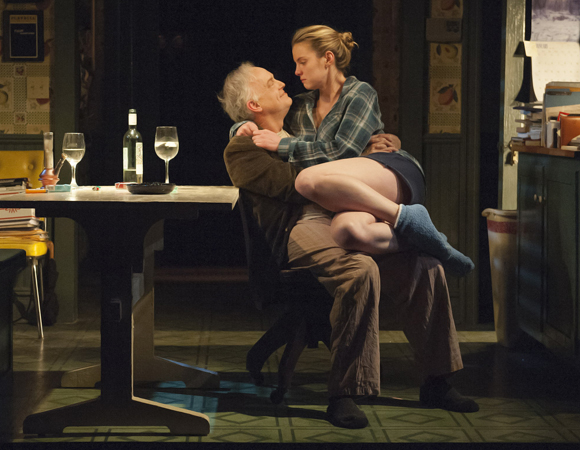Halley Feiffer and Betty Gilpin on Being "Anything but Safe" in I'm Gonna Pray for You So Hard
“Halley’s writing…it’s like Orphan Annie holding a gun.”
The first thing you notice about playwright Halley Feiffer and actress Betty Gilpin is how alike they are. Both share similar physical features, a lacerating wit, and a keen intelligence. Both also grew up around the footlights. Feiffer is the daughter of cartoonist/playwright Jules Feiffer and monologist Jenny Allen; Gilpin is the child of actors Jack Gilpin and Ann McDonough. And they've followed in their parents' footsteps as actors; though Feiffer, a Theater World Award winner for her performance in the 2010 Broadway revival of The House of Blue Leaves, has recently begun to put her writing career first.
Feiffer's latest play, I'm Gonna Pray for You So Hard at Atlantic Stage 2, is a scathing dark comedy that centers on the relationship between playwright David (Reed Birney), and his actress daughter, Ella (Gilpin), as they await the opening-night reviews for her first major off-Broadway performance. It's a vigorously physical and emotionally difficult play for both actors, and Gilpin is required to channel the ugliest parts of herself and bring them to life in raw and staggering ways. Feiffer and Gilpin sat down to talk about fearless writing, daddy issues, and the Greek tragedy (or maybe comedy) behind it all.

(© David Gordon)
Halley, what kind of play did you set out to write, and how did it become I'm Gonna Pray for You So Hard?
Halley Feiffer: I was always interested in the disparity between how a revered public figure looks on the outside, and what the truth is behind closed doors. For years I had wanted to write something about an aging patriarch who's very successful and is adored by the world, but has some sort of secret, and then a daughter who is spurned by him, or spurns him. My first thought was that the father was going to be a David Lynch-ian filmmaker who had just written a book on transcendental meditation and then got caught having an affair with a thirteen-year-old boy in his meditation class. I saw No Child… at Barrow Street, which has nothing to do with this play, but I was like, "Oh, what if the daughter writes a one-woman show about her father?" That cracked the play wide open.
Betty, what was your first reaction when you read it?
Betty Gilpin: I remember being floored by it and Halley's writing. Halley's writing has a…it's like Orphan Annie holding a gun. She gets all of the parts of women and wants you to use all the parts of you. All the ugly parts and the scary parts and the screaming. All the things you're afraid of. She just puts it all on the paper and is not afraid to talk about things that people are afraid to talk about, like self-loathing, or blackheads. Halley just nailed that and I was really excited, and super scared. I've never been so scared of doing something my whole life.
Halley: Reed [Birney] keeps saying it's the hardest role he's ever played, and he's much older than you. [laughs]
Betty: I've done plays where you get into the run and can go to auditions during the day, or can have lunch with someone, and then you go to half-hour and show up. But my day is consumed by this show, as is Reed's. Sometimes it's like Reed and I are on a little rowboat in the middle of the ocean. I'm in Reed's hands and he throws me up as high as he can and then I plummet down. I don't realize how much it's costing [me] until the subway ride home or when I'm trying to get to sleep. Reed and I are telling our bodies for ninety minutes that there's an emergency, that something real and ecstatic and terrifying and horrible is happening. And then it's like, "Just kidding! Curtain call. 'Night-'night. Do it again tomorrow."
In the play, Reed's character advises his daughter to "be anything but safe." Halley, is that your M.O. as a playwright?
Betty: Yeah, have you always been that brave? I feel like it's never something that's not brave, and really risky, and scary.
Halley: That's how I feel about you as an actor!
Betty: Well, I'm worried for us, for that reason.
Halley: I don't, honestly, think when I'm writing, I hope people feel a certain way. I just write from my own experience of life. I never experience what [is happening to] these characters verbatim…I'm interested in exploring that with these characters and seeing the parts of ourselves that we wish weren't there.
I've probably felt the feelings she feels, just diluted by eight thousand, you know? So let's embrace the theatricality. If I wanted to make a mumblecore indie film, it wouldn't be this heightened.
This play is very Greek in nature and provides a contemporary version of the recurring cycle of violence. Betty, what did you notice about that from the acting perspective?
Betty: I think it has to be played as Greek. Sometimes, I was like, "God, I'm just sick of the shrill sound of my voice. Is it healthy or believable to start here all the time?" [raises her hand to set a high bar]. I would try in rehearsal making it more kitchen-sink in the playing of it and that just didn't work.
Halley: It doesn't work, I know. It was the same thing with [my play] How to Make Friends and Then Kill Them last year. During our first read-through, the actresses were talking as humans do, and we went to lunch break, and the director and I talked, and afterwards he was like, "You have to do this at quadruple speed. If the character's happy, they have to be orgasmic, and if they're sad, they have to be four seconds away from suicide." That's just where these characters live. That's a very different style of play, but it's true in this play too.
Could this have been a play that's not set in the world of theater? Would it still work if the characters have been, say, a doctor and his daughter?
Betty: I'm really glad it's set in the theater. We both grew up in theater households. Hearing about it and seeing it and being in the wings, it seemed like the closest thing you can get to magic in the world. [But] when you get older [you realize that] there's magic when it's great, but there are also really bad versions of it, and it can ruin you as a person. It's a product to be sold. [And] to put a price tag on magic [makes it] a ticking time bomb, [which] isn't the reason we got into it.
Halley: That's so well said. The play explores if you put the cart before the horse. If you put the Drama Desk Award before "I want to write a good play," then you'll always be miserable. And that's what both these characters do. One is able to change their value system, and one isn't, and we see what that change and lack of change has on both of them.

(© Ahron R. Foster)









